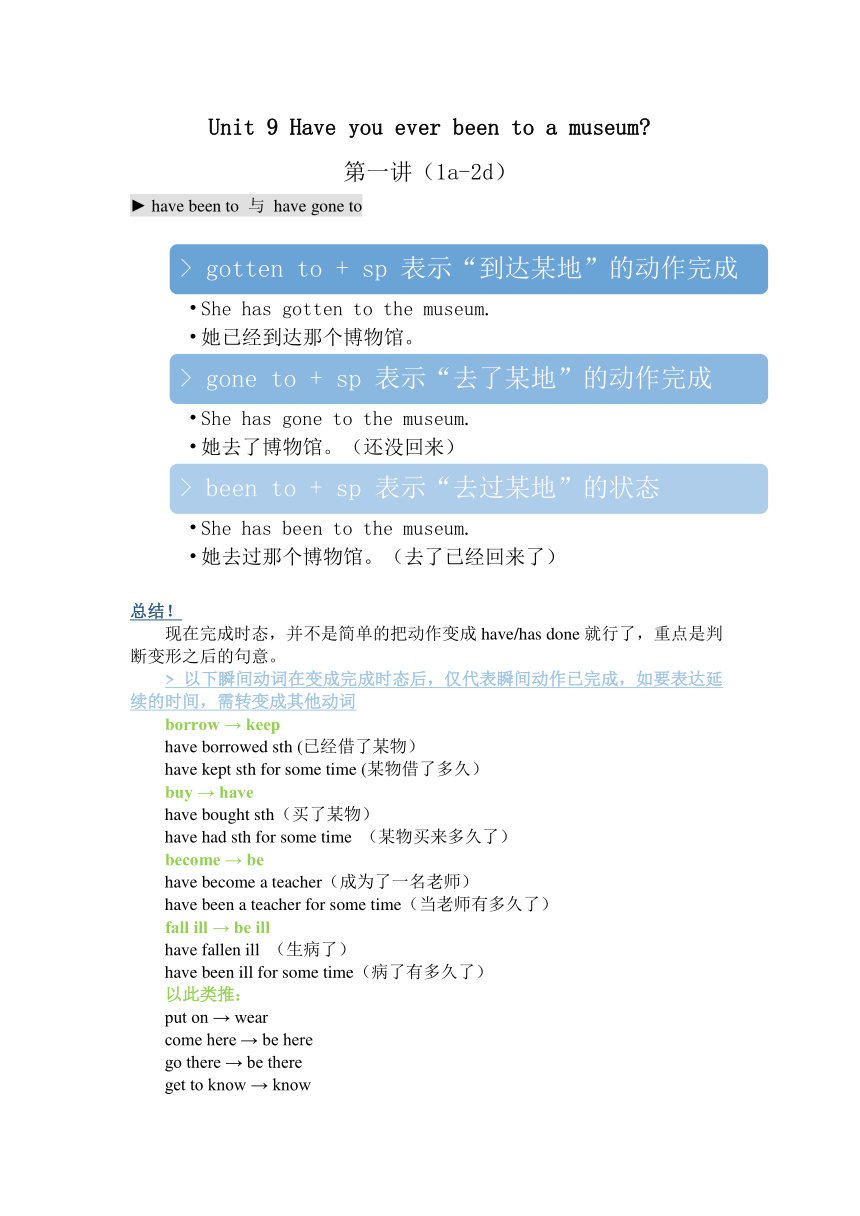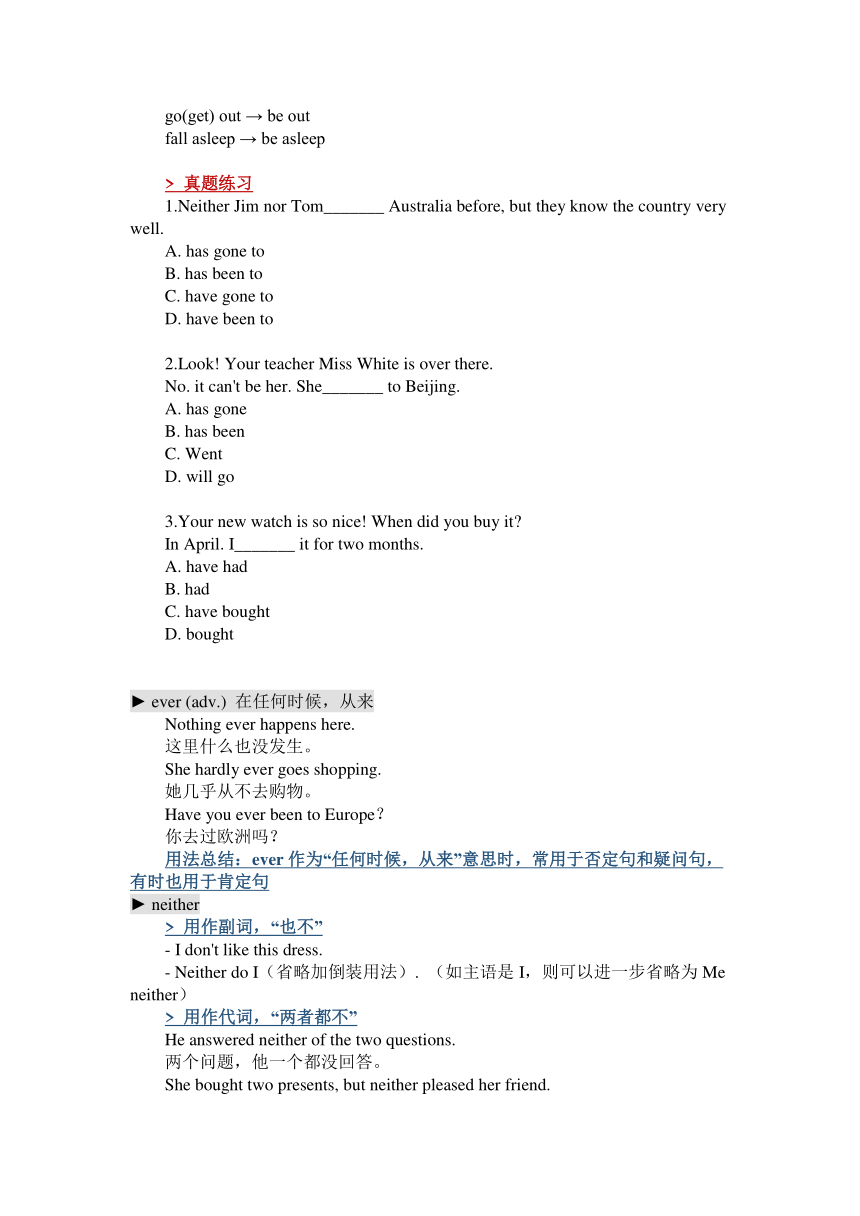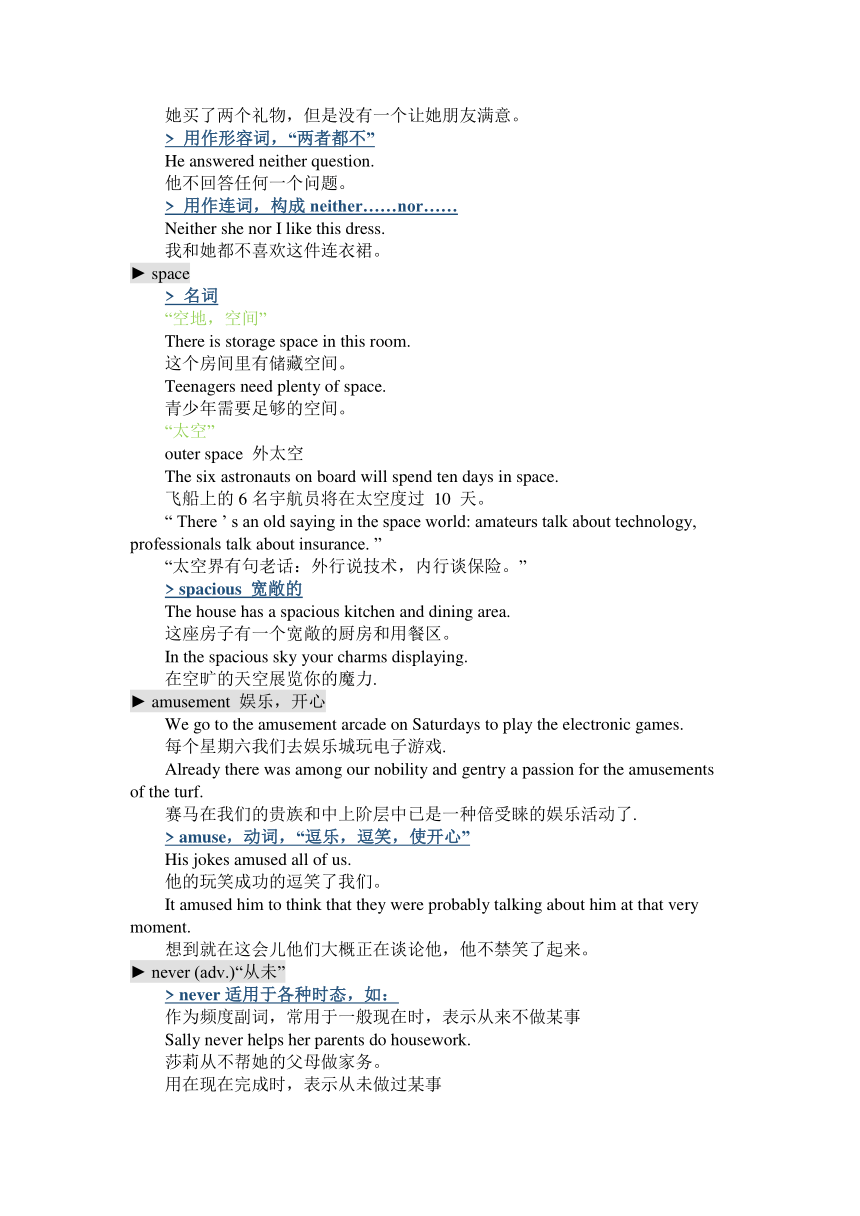Unit 9 Have you ever been to a museum Section A 知识点梳理
文档属性
| 名称 | Unit 9 Have you ever been to a museum Section A 知识点梳理 |

|
|
| 格式 | docx | ||
| 文件大小 | 33.8KB | ||
| 资源类型 | 教案 | ||
| 版本资源 | 人教新目标(Go for it)版 | ||
| 科目 | 英语 | ||
| 更新时间 | 2024-07-30 00:00:00 | ||
图片预览



文档简介
Unit 9 Have you ever been to a museum
第一讲(1a-2d)
have been to 与 have gone to
总结!
现在完成时态,并不是简单的把动作变成have/has done就行了,重点是判断变形之后的句意。
> 以下瞬间动词在变成完成时态后,仅代表瞬间动作已完成,如要表达延续的时间,需转变成其他动词
borrow → keep
have borrowed sth (已经借了某物)
have kept sth for some time (某物借了多久)
buy → have
have bought sth(买了某物)
have had sth for some time (某物买来多久了)
become → be
have become a teacher(成为了一名老师)
have been a teacher for some time(当老师有多久了)
fall ill → be ill
have fallen ill (生病了)
have been ill for some time(病了有多久了)
以此类推:
put on → wear
come here → be here
go there → be there
get to know → know
go(get) out → be out
fall asleep → be asleep
> 真题练习
1.Neither Jim nor Tom_______ Australia before, but they know the country very well.
A. has gone to
B. has been to
C. have gone to
D. have been to
2.Look! Your teacher Miss White is over there.
No. it can't be her. She_______ to Beijing.
A. has gone
B. has been
C. Went
D. will go
3.Your new watch is so nice! When did you buy it
In April. I_______ it for two months.
A. have had
B. had
C. have bought
D. bought
ever (adv.) 在任何时候,从来
Nothing ever happens here.
这里什么也没发生。
She hardly ever goes shopping.
她几乎从不去购物。
Have you ever been to Europe?
你去过欧洲吗?
用法总结:ever作为“任何时候,从来”意思时,常用于否定句和疑问句,有时也用于肯定句
neither
> 用作副词,“也不”
- I don't like this dress.
- Neither do I(省略加倒装用法). (如主语是I,则可以进一步省略为Me neither)
> 用作代词,“两者都不”
He answered neither of the two questions.
两个问题,他一个都没回答。
She bought two presents, but neither pleased her friend.
她买了两个礼物,但是没有一个让她朋友满意。
> 用作形容词,“两者都不”
He answered neither question.
他不回答任何一个问题。
> 用作连词,构成neither……nor……
Neither she nor I like this dress.
我和她都不喜欢这件连衣裙。
space
> 名词
“空地,空间”
There is storage space in this room.
这个房间里有储藏空间。
Teenagers need plenty of space.
青少年需要足够的空间。
“太空”
outer space 外太空
The six astronauts on board will spend ten days in space.
飞船上的6名宇航员将在太空度过 10 天。
“ There ’ s an old saying in the space world: amateurs talk about technology, professionals talk about insurance. ”
“太空界有句老话:外行说技术,内行谈保险。”
> spacious 宽敞的
The house has a spacious kitchen and dining area.
这座房子有一个宽敞的厨房和用餐区。
In the spacious sky your charms displaying.
在空旷的天空展览你的魔力.
amusement 娱乐,开心
We go to the amusement arcade on Saturdays to play the electronic games.
每个星期六我们去娱乐城玩电子游戏.
Already there was among our nobility and gentry a passion for the amusements of the turf.
赛马在我们的贵族和中上阶层中已是一种倍受睐的娱乐活动了.
> amuse,动词,“逗乐,逗笑,使开心”
His jokes amused all of us.
他的玩笑成功的逗笑了我们。
It amused him to think that they were probably talking about him at that very moment.
想到就在这会儿他们大概正在谈论他,他不禁笑了起来。
never (adv.)“从未”
> never适用于各种时态,如:
作为频度副词,常用于一般现在时,表示从来不做某事
Sally never helps her parents do housework.
莎莉从不帮她的父母做家务。
用在现在完成时,表示从未做过某事
I've never seen such a beautiful girl.
我从未见过这么漂亮的女孩。
> never本身具有否定意义,相比于not,语气更强
乘坐交通工具
> take/ride + 交通工具
take the bus
乘坐公共汽车
take the subway
乘地铁
take a taxi
乘出租车
ride my bike
骑自行车
walk to some place
走到某个地方
> by+交通工具
go to the hospital by bus
乘公共汽车去医院
go to the supermarket by subway
乘地铁去超市
go to school by bike
骑自行车去上学
skate 滑冰,溜冰
go skating 去滑冰
skates 溜冰鞋
It was so cold that we were able to go skating on the lake.
天气极冷,我们能到湖上去滑冰了。
He skated an exciting programme at the American Championships.
他在美国锦标赛上滑出一组扣人心弦的动作。
far away(adj.&adv.) 离得很远
> 短语拆解
far(adj./adv.) 远,遥远
away(adv.) 离…有多远
> 用法
The mountain is far away.(做表语)
这座山距离我们很远。
They live far away.(做状语)
他们住的很远。
My home is not far away from here.(跟from连用,表示距离某地多远)
我的家离这里不远。
My home is far from school.(away可以省略)
我的家离学校很远。
My home is 5 kilometers away from school.(far可以替换成具体的距离)
我的家里学校有五公里那么远。
第二讲(3a-4c)
反义疑问句
> 什么是反义疑问句?
当我们陈述了一个事实,而又不是很有把握,就可以在陈述句后加一个简短问句,称为反意疑问句.
> 怎么写反义疑问句?
第一步:将陈述句改写成一般疑问句
You like pop music. Do you like pop music
第二步:按“前肯后否,前否后肯“原则,修改疑问句的“肯否”
You like pop music. Don't you like pop music
第三步:将疑问句中除“主语,助动词,be动词,情态动词”之外的部分省略
You like pop music, don't you
> 反义疑问句怎么回答?
不管问题是何种提法,若事实是肯定的,用 yes回答;若事实是否定的,就用 no 来回答
She is clever, isn't she
She is not clever, is she
Invention (n.) 发明,创造
> invent (v.) 发明
to produce or design sth that has not existed before
> 区分invent,discover,find,create
camp
> 做名词,“营地”
to pitch/make camp
Some campers have trailers which they drive or pull behind their cars to their camp sites.
一些露营者有拖车,他们可以驾驶拖车或把拖车放到车后拖拉,开到露营地.
Part of his mess kit was spotted less than a mile from the troop's camp.
在距离部队露营地不到一英里的地方发现了他的部分餐具.
> 做动词,“露营,宿营”
sb camp
sb go camping 去露营
Our scouts found signs of a hastily broken camp there.
我们的巡逻兵在那里发现一个在匆忙中被毁坏的宿营地.
He also tells them the address of the camp and their travel timetable.
同时,他也把宿营地址和行程安排告诉了他们.
unbelievable (adj.) 难以置信的
believable 可信的
In the aftermath of George's death, the outpouring of support and sympathy was unbelievable.
在乔治死后, 人们流露出来的支持和同情之心是令人难以置信的.
It's absolutely the most unbelievable game that I've ever seen!
这绝对是我看过的最令人难以置信的比赛!
progress
> 名词,“进步”,“进程”
Make (great) progress 取得巨大的进步
This plan is now in progress. 该计划还在进行中
> 动词,“进步”,“进行”
Students should be allowed to progress at their own speed. 学生们应该被允许按照他们自己的速度进步
This plan is progressing now.该计划在进行中
such 和 so 构成的感叹句
> such, 形容词,“如此的”
such + a/an + adj. + 可数名词单数
Such an interesting book.
Such + adj. + 复数名词或不可数名词
Such clever children
> so, 副词,“如此地”
so+ adj./adv
So interesting
so + adj. + a/an + n.
So interesting a book
so + many/few + 复数名词
So many books
so + much/little + 不可数名词
So much money
rapid (adj.) 快速的
近义词:quick, fast
A rapid and accurate method for the inspection of export ferrophosphorus is elaborated in this paper.
介绍我省出口磷铁所采用的精确、快速的检验方法及其分析研究.
At home, rapid growth will bring social and economic turbulence.
在国内, 快速的发展将带来社会和经济动荡.
unusual (adj.) 特别的,不寻常的
It's not unusual for young doctors to work a 70-hour week (= it happens often) .
年轻的医生每周工作70小时并不罕见。
They have replanted many areas with rare and unusual plants...
他们在许多地方重新种上了珍稀植物。
usual 常见的,寻常的
usually 通常,经常
believe 和 believe in
> believe
to feel certain that sth is true or that sb is telling you the truth
believe him
believe his words
believe what he said
believe that he is right.
can't believe… 表示吃惊
> believe in
相信某人(或事物)的存在 to feel certain that sb/sth exists
Do you believe in ghost
你相信有鬼吗?
信赖;信任;相信某人会成功 to feel that you can trust sb and/or that they will be successful
Students need a teacher they can believe in.
学生们需要一个他们可以相信的老师。
认为某事好(或对、可接受)to think that sth is good, right or acceptable
I don't believe in punishing children.
我不认为惩罚是对孩子们好。
encourage 鼓励;促使
> 构词
en(使得)+courage(勇气)→ 使有勇气 → “鼓励,激励,促使”
We were greatly encouraged by the positive response of the public.
公众所持的肯定态度给了我们极大的鼓舞。
Banks actively encourage people to borrow money.
银行积极鼓动人们贷款。
They claim that some computer games encourage violent behaviour in young children.
他们声称有些电脑游戏助长儿童的暴力行为。
> 搭配
encourage sb in sth 在某事上鼓励某人
encourage sb to do sth 鼓励某人做某事
第一讲(1a-2d)
have been to 与 have gone to
总结!
现在完成时态,并不是简单的把动作变成have/has done就行了,重点是判断变形之后的句意。
> 以下瞬间动词在变成完成时态后,仅代表瞬间动作已完成,如要表达延续的时间,需转变成其他动词
borrow → keep
have borrowed sth (已经借了某物)
have kept sth for some time (某物借了多久)
buy → have
have bought sth(买了某物)
have had sth for some time (某物买来多久了)
become → be
have become a teacher(成为了一名老师)
have been a teacher for some time(当老师有多久了)
fall ill → be ill
have fallen ill (生病了)
have been ill for some time(病了有多久了)
以此类推:
put on → wear
come here → be here
go there → be there
get to know → know
go(get) out → be out
fall asleep → be asleep
> 真题练习
1.Neither Jim nor Tom_______ Australia before, but they know the country very well.
A. has gone to
B. has been to
C. have gone to
D. have been to
2.Look! Your teacher Miss White is over there.
No. it can't be her. She_______ to Beijing.
A. has gone
B. has been
C. Went
D. will go
3.Your new watch is so nice! When did you buy it
In April. I_______ it for two months.
A. have had
B. had
C. have bought
D. bought
ever (adv.) 在任何时候,从来
Nothing ever happens here.
这里什么也没发生。
She hardly ever goes shopping.
她几乎从不去购物。
Have you ever been to Europe?
你去过欧洲吗?
用法总结:ever作为“任何时候,从来”意思时,常用于否定句和疑问句,有时也用于肯定句
neither
> 用作副词,“也不”
- I don't like this dress.
- Neither do I(省略加倒装用法). (如主语是I,则可以进一步省略为Me neither)
> 用作代词,“两者都不”
He answered neither of the two questions.
两个问题,他一个都没回答。
She bought two presents, but neither pleased her friend.
她买了两个礼物,但是没有一个让她朋友满意。
> 用作形容词,“两者都不”
He answered neither question.
他不回答任何一个问题。
> 用作连词,构成neither……nor……
Neither she nor I like this dress.
我和她都不喜欢这件连衣裙。
space
> 名词
“空地,空间”
There is storage space in this room.
这个房间里有储藏空间。
Teenagers need plenty of space.
青少年需要足够的空间。
“太空”
outer space 外太空
The six astronauts on board will spend ten days in space.
飞船上的6名宇航员将在太空度过 10 天。
“ There ’ s an old saying in the space world: amateurs talk about technology, professionals talk about insurance. ”
“太空界有句老话:外行说技术,内行谈保险。”
> spacious 宽敞的
The house has a spacious kitchen and dining area.
这座房子有一个宽敞的厨房和用餐区。
In the spacious sky your charms displaying.
在空旷的天空展览你的魔力.
amusement 娱乐,开心
We go to the amusement arcade on Saturdays to play the electronic games.
每个星期六我们去娱乐城玩电子游戏.
Already there was among our nobility and gentry a passion for the amusements of the turf.
赛马在我们的贵族和中上阶层中已是一种倍受睐的娱乐活动了.
> amuse,动词,“逗乐,逗笑,使开心”
His jokes amused all of us.
他的玩笑成功的逗笑了我们。
It amused him to think that they were probably talking about him at that very moment.
想到就在这会儿他们大概正在谈论他,他不禁笑了起来。
never (adv.)“从未”
> never适用于各种时态,如:
作为频度副词,常用于一般现在时,表示从来不做某事
Sally never helps her parents do housework.
莎莉从不帮她的父母做家务。
用在现在完成时,表示从未做过某事
I've never seen such a beautiful girl.
我从未见过这么漂亮的女孩。
> never本身具有否定意义,相比于not,语气更强
乘坐交通工具
> take/ride + 交通工具
take the bus
乘坐公共汽车
take the subway
乘地铁
take a taxi
乘出租车
ride my bike
骑自行车
walk to some place
走到某个地方
> by+交通工具
go to the hospital by bus
乘公共汽车去医院
go to the supermarket by subway
乘地铁去超市
go to school by bike
骑自行车去上学
skate 滑冰,溜冰
go skating 去滑冰
skates 溜冰鞋
It was so cold that we were able to go skating on the lake.
天气极冷,我们能到湖上去滑冰了。
He skated an exciting programme at the American Championships.
他在美国锦标赛上滑出一组扣人心弦的动作。
far away(adj.&adv.) 离得很远
> 短语拆解
far(adj./adv.) 远,遥远
away(adv.) 离…有多远
> 用法
The mountain is far away.(做表语)
这座山距离我们很远。
They live far away.(做状语)
他们住的很远。
My home is not far away from here.(跟from连用,表示距离某地多远)
我的家离这里不远。
My home is far from school.(away可以省略)
我的家离学校很远。
My home is 5 kilometers away from school.(far可以替换成具体的距离)
我的家里学校有五公里那么远。
第二讲(3a-4c)
反义疑问句
> 什么是反义疑问句?
当我们陈述了一个事实,而又不是很有把握,就可以在陈述句后加一个简短问句,称为反意疑问句.
> 怎么写反义疑问句?
第一步:将陈述句改写成一般疑问句
You like pop music. Do you like pop music
第二步:按“前肯后否,前否后肯“原则,修改疑问句的“肯否”
You like pop music. Don't you like pop music
第三步:将疑问句中除“主语,助动词,be动词,情态动词”之外的部分省略
You like pop music, don't you
> 反义疑问句怎么回答?
不管问题是何种提法,若事实是肯定的,用 yes回答;若事实是否定的,就用 no 来回答
She is clever, isn't she
She is not clever, is she
Invention (n.) 发明,创造
> invent (v.) 发明
to produce or design sth that has not existed before
> 区分invent,discover,find,create
camp
> 做名词,“营地”
to pitch/make camp
Some campers have trailers which they drive or pull behind their cars to their camp sites.
一些露营者有拖车,他们可以驾驶拖车或把拖车放到车后拖拉,开到露营地.
Part of his mess kit was spotted less than a mile from the troop's camp.
在距离部队露营地不到一英里的地方发现了他的部分餐具.
> 做动词,“露营,宿营”
sb camp
sb go camping 去露营
Our scouts found signs of a hastily broken camp there.
我们的巡逻兵在那里发现一个在匆忙中被毁坏的宿营地.
He also tells them the address of the camp and their travel timetable.
同时,他也把宿营地址和行程安排告诉了他们.
unbelievable (adj.) 难以置信的
believable 可信的
In the aftermath of George's death, the outpouring of support and sympathy was unbelievable.
在乔治死后, 人们流露出来的支持和同情之心是令人难以置信的.
It's absolutely the most unbelievable game that I've ever seen!
这绝对是我看过的最令人难以置信的比赛!
progress
> 名词,“进步”,“进程”
Make (great) progress 取得巨大的进步
This plan is now in progress. 该计划还在进行中
> 动词,“进步”,“进行”
Students should be allowed to progress at their own speed. 学生们应该被允许按照他们自己的速度进步
This plan is progressing now.该计划在进行中
such 和 so 构成的感叹句
> such, 形容词,“如此的”
such + a/an + adj. + 可数名词单数
Such an interesting book.
Such + adj. + 复数名词或不可数名词
Such clever children
> so, 副词,“如此地”
so+ adj./adv
So interesting
so + adj. + a/an + n.
So interesting a book
so + many/few + 复数名词
So many books
so + much/little + 不可数名词
So much money
rapid (adj.) 快速的
近义词:quick, fast
A rapid and accurate method for the inspection of export ferrophosphorus is elaborated in this paper.
介绍我省出口磷铁所采用的精确、快速的检验方法及其分析研究.
At home, rapid growth will bring social and economic turbulence.
在国内, 快速的发展将带来社会和经济动荡.
unusual (adj.) 特别的,不寻常的
It's not unusual for young doctors to work a 70-hour week (= it happens often) .
年轻的医生每周工作70小时并不罕见。
They have replanted many areas with rare and unusual plants...
他们在许多地方重新种上了珍稀植物。
usual 常见的,寻常的
usually 通常,经常
believe 和 believe in
> believe
to feel certain that sth is true or that sb is telling you the truth
believe him
believe his words
believe what he said
believe that he is right.
can't believe… 表示吃惊
> believe in
相信某人(或事物)的存在 to feel certain that sb/sth exists
Do you believe in ghost
你相信有鬼吗?
信赖;信任;相信某人会成功 to feel that you can trust sb and/or that they will be successful
Students need a teacher they can believe in.
学生们需要一个他们可以相信的老师。
认为某事好(或对、可接受)to think that sth is good, right or acceptable
I don't believe in punishing children.
我不认为惩罚是对孩子们好。
encourage 鼓励;促使
> 构词
en(使得)+courage(勇气)→ 使有勇气 → “鼓励,激励,促使”
We were greatly encouraged by the positive response of the public.
公众所持的肯定态度给了我们极大的鼓舞。
Banks actively encourage people to borrow money.
银行积极鼓动人们贷款。
They claim that some computer games encourage violent behaviour in young children.
他们声称有些电脑游戏助长儿童的暴力行为。
> 搭配
encourage sb in sth 在某事上鼓励某人
encourage sb to do sth 鼓励某人做某事
同课章节目录
- Unit 1 What's the matter?
- Section A
- Section B
- Unit 2 I'll help to clean up the city parks.
- Section A
- Section B
- Unit 3 Could you please clean your room?
- Section A
- Section B
- Unit 4 Why don't you talk to your parents?
- Section A
- Section B
- Unit 5 What were you doing when the rainstorm came
- Section A
- Section B
- Review of Units 1-5
- Unit 6 An old man tried to move the mountains.
- Section A
- Section B
- Unit 7 What's the highest mountain in the world?
- Section A
- Section B
- Unit 8 Have you read Treasure Island yet?
- Section A
- Section B
- Unit 9 Have you ever been to a museum?
- Section A
- Section B
- Unit 10 I've had this bike for three years.
- Section A
- Section B
